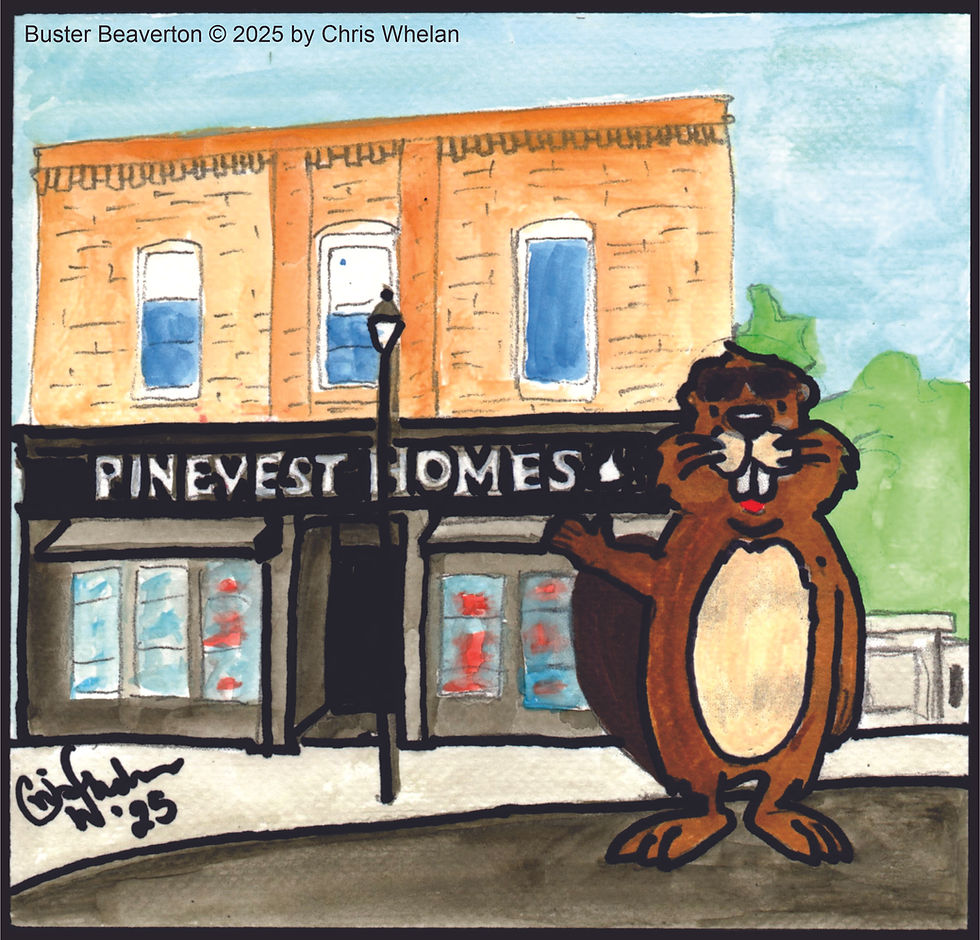OP-ED: A Developer with deep local roots and a broader sense of community
- Casandra Turnbull
- Jul 29
- 3 min read

Casandra Turnbull
Managing Editor
The focus of this week’s editorial is Pinevest Homes. Following our July 16th edition, which featured two subdivision applications presented to Brant County Council on behalf of the Paris-based builder, a reader reached out with a pointed question: “Who are they? I know they have an ‘office’ downtown, but where is their main office and exactly how do they contribute to our community? Pinevest has made a good living here and I'd like to know how they are putting back into our small community... is it a two-way business?”
It’s a fair question—and one that gets to the heart of how development in small communities should be evaluated. In an era where land development often feels transactional and profit-d riven, residents are right to expect transparency and accountability. The goal of this editorial is not to praise one builder over another, but rather to examine what sets Pinevest Homes apart—and why its model merits attention.
Founded in 2013 by Henry Stolp, Gary Norris, and Brad Wilson, Pinevest Homes is a locally rooted company with a track record of building more than homes. Their projects include custom and semi-custom homes on estate lots, detached homes, and modern condos in neighbourhoods such as Cedar Lane and Riverview Highlands in Paris, and Glen Morris Country Estates. They don’t build at the scale of large national developers—but that appears to be by design. Their approach emphasizes quality over quantity, and community fit over maximized square footage.
This commitment is reflected not only in the types of homes they construct, but in how they engage with the surrounding community. Pinevest has contributed more than $120,000 in recent years to support local infrastructure and beautification efforts (in what research we were able to conduct, that figure could be larger). That includes $20,000 toward the Wilkin Family Community Centre, $50,000 to the County of Brant Health Hub for garden space, and another $50,000 to the Brant Waterways Foundation to enhance trails and river access. They’ve helped upgrade lighting at Penman’s Dam and the Paris Outdoor Pool, donated 1,000 flower bulbs for local parks and cemeteries, and even funded the installation of a historic-style street clock in downtown St. George. Their support of youth programs, lawn bowling, and local hockey further reflects a holistic view of what it means to build community—not just subdivisions.
This kind of investment is rare. Developers are businesses, and profit is certainly part of the equation—no one is pretending otherwise. But Pinevest appears to approach its work with a sense of long-term responsibility. That became particularly evident during a recent Brant County Council planning meeting, where county staff and councillors noted the collaborative approach Pinevest took in designing its proposed subdivisions. The company reportedly worked closely with municipal staff to ensure the developments aligned with the County’s Official Plan and respected the needs of the community, including considerations for affordable and mixed-use housing.
This approach stands in contrast to what many communities across Ontario experience: proposals pushed through with little regard for long-term infrastructure capacity, school availability, or quality of life for existing residents. Larger-scale developers, often headquartered far from the communities they build in, can lack both the incentive and the institutional memory to create something lasting or locally meaningful.
The leadership at Pinevest includes individuals with both deep local ties and significant industry experience. Henry Stolp, a Brant County resident, is married to Jane Stewart, former Member of Parliament for Brant and a federal cabinet minister. The two were married in a local ceremony on a family farm outside of St. George. Pete Schut, a former Senior Vice President at Brookfield, and Bob Stewart, formerly of Brookfield Residential, both left large corporate roles to focus on regional development that aligns with their home community’s values. Their expertise in land development, paired with their familiarity with Brant County’s social and political landscape, results in a builder that not only understands how to work with municipal staff—but is willing to.
It’s also worth noting that Pinevest’s physical office is not a placeholder—it’s a functional base in downtown Paris, on Grand River Street North, in the very heart of the community they continue to shape.
Ultimately, Pinevest Homes is not the only developer operating in our region, nor should it be. Diversity in scale and approach helps meet housing needs across demographics and income levels. But as questions arise about the integrity and intentions of those who profit from local development, it’s important to recognize the examples that stand out for the right reasons.
Yes, Pinevest is a business. But it’s also a neighbour—one that appears to be building more than homes. It's attempting to build trust. And in today’s development landscape, that’s worth acknowledging.




Comments